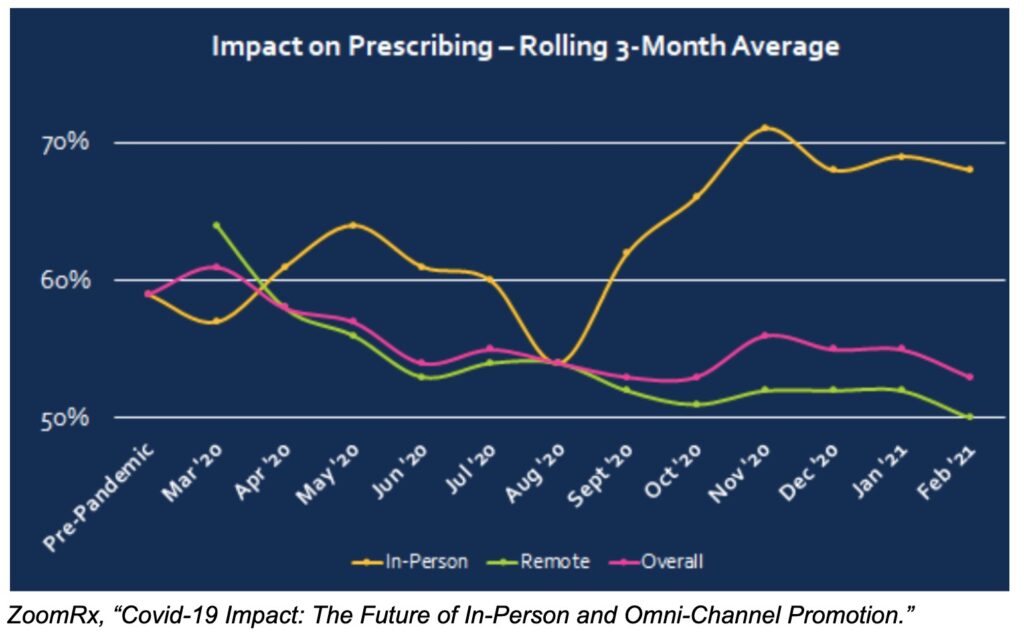Drug launch is a critical and complex component in the parma value chain. Now more than ever, pharmaceutical companies face significant challenges. Covid-19 has changed the way we interact on a global scale, while technological advances and novel business models continue to disrupt the market. Finally, stakeholders’ attitudes and expectations continue to change at a rapid rate.
Artificial intelligence (AI) is the most appropriate way to meet these new challenges. Implemented properly, AI can be used to bolster sales and marketing efforts, ensure and facilitate market access, streamline regulatory compliance, and boost patient and practitioner engagement and education.
In this article, I look at each of these four key launch areas in detail and provide some keys to leveraging AI for drug launch success.
Sales and Marketing
In pharmaceuticals and beyond, sales and marketing is one of the domains where the effects of the digital revolution (and Covid-19) are most salient. However, according to one study, remote sales rep interactions, in their current state, have proven less effective than in-person meetings.

Of course, digital sales and marketing tactics and tools, as we’ll see, go far beyond remote meetings—but the data does serve to highlight the fact that prescribing rates have been fundamentally impacted by the shift towards digital solutions, and that there is plenty of room for improvement.
AI can help with this task in a number of ways. First, it can be used with great success in market segmentation, which has overall been quite slow to change despite the many new actors involved (such as pharmacists, physicians’ assistants, and patient associations). Customers today expect a more personalized experience, which requires more granular and data-driven market segmentation. This can only be achieved by compiling and analyzing vast amounts of data from a variety of traditional (e.g., prescribing levels) and novel (e.g., CRM, publications, physician forums, social media behavior) sources—the kind of thing AI excels at.
The same data can be used further down the sales and marketing pipeline as well. Message optimization can be achieved on a large scale thanks to AI and machine learning (ML). This means more relevant information, delivered at the right time and using the most effective channels. With intelligent automation driving such interactions, sales and marketing teams can leverage the many benefits of real-time marketing in ways that were never open to pharmaceutical companies before.
These are just some of the ways AI can be successfully used to boost sales and marketing in pharmaceuticals. For those who are interested, I recommend checking out these 16 examples of successful applications of AI in pharma marketing (Part I; Part II; Part III).
Market Access
In a previous article, I discussed the role of AI in market access and pricing and addressed some of the most salient issues that AI can help address, including shifting expectations regarding reimbursement and delivery models. Much has changed in recent years, and the opportunities to successfully leverage AI and improve market access continue to grow.
Faced with significant challenges, including rising pressure regarding pricing and reimbursement, changing expectations from payers, practitioners and patients, and an increasingly fragmented and complex stakeholder ecosystem, pharmaceutical companies looking to improve on market access must put in place an effective AI market access strategy to better manage and predict pricing, accelerate reimbursements, and engage stakeholders. We explore how in this article.
Regulatory Compliance
The digital age has come with new regulatory hurdles, notably with the advent of digital therapeutics (DTx), a wholly novel set of treatments and regulatory requirements. And as the storage, analysis, and exchange of patient data—both clinical and personal—increases, so too do privacy regulations become more strict, more technical.
Fortunately, there are plenty of digital solutions to help out. In fact, AI approaches can reduce regulatory compliance time by 25% and deliver improved resource management—both of which mean better profits for pharma companies.
Pharmacovigilance also represents an important opportunity for improvements from AI. Data sources and formats continue to increase in diversity and volume, while, from case receipt to reporting, processes are becoming more complex. Only with AI can pharma companies hope to fully benefit from the vast sea of data now available, allowing for more accurate insights along with reduced costs.
Practitioner and Patient Engagement
Finally, AI can help pharmaceutical companies engage more effectively with practitioners and patients, both of whom are eager for more convenient, informative, and candid interactions with providers.
In a recent webinar, panelists highlighted this point regarding, in particular, young, tech-savvy physicians in search of a better work–life balance. But regardless of age or work habits, many still lament the dated methods used by pharmaceutical companies.
“I still have a stack of business cards with information of 20–30 different pharmaceutical and medical device reps,” says panelist Dr. Mehra. “I cannot think of any other industry that would do that—if I order food or call a cab, everything is streamlined and really done through the phone.” Many of the AI tools used in sales and marketing can be brought to bear on this problem, allowing for more personalized, more accessible, and more transparent interactions with physicians. When it comes to launching new drugs, getting practitioners on board is paramount. AI can help pharma companies do this with staggering effectiveness.
The same goes for engaging directly with patients, something that has always been a rather complex affair for pharmaceutical companies. Historically, practitioners have acted as the middle-man, with little to no bidirectional communication seen between providers and patients. AI is changing this, enabling pharma companies to engage with patients through sophisticated chatbots, for example, and improve patient compliance through AI-powered reminders and phone applications built to accompany molecules.
Keys to Success
As we’ve seen, the potential uses of AI in product launch for pharma are myriad. Pharma companies hoping to successfully embed AI into drug launch should ensure the following goals are met.
First, introduce AI into workflows early on. This is true chronologically, of course, as delays of weeks or even days are typically measured in tens of millions in lost revenue, and implementing an effective AI strategy takes time and planning. But it’s also true processually; introducing AI early on in the drug launch lifecycle means compounded benefits downstream, as insights gleaned from market definition and segmentation feed into regulatory submission and review, product marketing strategies, pricing and reimbursement models, right up to Phase IV and beyond.
One of the reasons this is true is that AI thrives on data. As a general rule, the more you have, the better. Unstructured, unexploited data represents a massive opportunity for most pharma companies. Determine where your richest sources of data lie and then build an AI strategy that leverages them effectively.
Finally, ensure internal stakeholders are enthusiastic about and comfortable using novel AI tools. Establishing a narrative and a roadmap, communicating it and championing it, and empowering people to work in new ways with advanced tools are all part of a successful digital transformation.
Conclusion
Drug launch is a complex and lengthy process, often spanning years and costing millions of dollars. This complexity and length, however, make it a prime candidate for leveraging the power of AI. Sales and marketing, market access, regulatory compliance, and HCP and patient engagement will all benefit from the successful implementation of a well-planned, data-driven AI strategy.
Found this article interesting?
If you’re looking for help on creating an AI powered drug launch for supercharged results, speak with us.
For more information, contact Dr Andree Bates abates@eularis.com.

